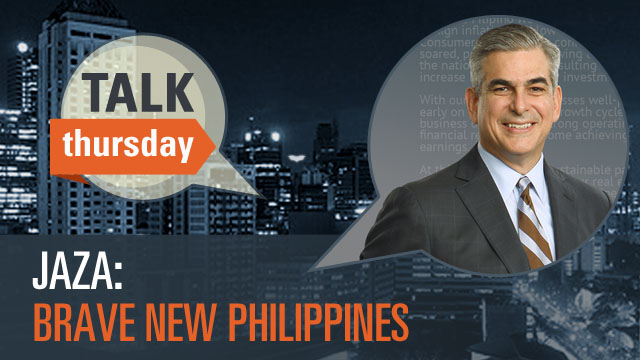SUMMARY
This is AI generated summarization, which may have errors. For context, always refer to the full article.

MANILA, Philippines – Is the Philippines’ high economic growth sustainable?
Businessman Jaime Augusto Zobel de Ayala, who heads the country’s oldest conglomerate, Ayala Corp, believes so.
“Yes, [it is] very much [sustainable]. There are steps being taken by the Philippine government to lead to sustainability,” he told Rappler CEO Maria Ressa in this week’s #TalkThursday. Watch the interview below.
Key to sustainability, he noted, is credibility – a major consideration for investors when betting their money on a particular market.
And thanks to President Benigno Aquino’s good governance campaign, Zobel said the Philippines has started to regain this.
“We’ve had some difficult years in the past so credibility is hard to build… the Philippine government has put a great deal of emphasis on the issue of good governance. The President’s rating is very high and a lot of that has come from the kind of credibility he has brought to the standards of the country.”
Zobel said one of the main elements necessary to create sustainable economic growth – which is also the core of Aquino’s governance agenda – is now in place. “There is strong discipline beginning to take place in the fiscal side – like when you run a household or a company. The government is earning more than what it’s spending.”
The Aquino government has shown it could keep its fiscal house in order by reducing its budget deficit significantly, gaining the vote of confidence of the global market in the process.
In 2011, the country’s budget deficit reached nearly P198 billion, equivalent to just 2% of gross domestic product (GDP), against the record-high P314 billion, or 3.5% of GDP, in 2010 that was mostly attributed to the administration of Aquino’s predecessor, Gloria Arroyo.
Corruption vs transparency
The Philippines’ improved fiscal position was largely attributed to by international debt watchers like Standard & Poor’s, Moody’s and Fitch Ratings for the past 7 rating upgrades they gave the country.
But while they recognized the reduction in the country’s deficit, they also raised concern over the main factor that caused it – the delays in infrastructure spending. Underspending, along with weak exports, was blamed for the Philippines’ lackluster economic growth of 3.7% in 2011.
On this issue, Zobel was very forgiving. He said if the delays were necessary to get rid of corruption in public contracts, so be it. After all, he said the government has made up for underspending last year.
“I’d like to give Secretary (Rogelio) Singson a pat on the back. His department (Department of Public Works and Highways) has been spending a tremendous amount this year. We’ve had great growth in the first half and I believe this will continue in the second half. A lot of it is because of the government’s capacity to pump prime the economy.”
“I think Secretary Singson is one major component of that. He’s very transparent in the way he shows how his projects are taking place. It’s wonderful,” Zobel remarked.
Philippine GDP grew by a higher-than-expected 6.3% in the first quarter, the second-highest in Asia, next to China, owing in part to increased government spending. Growth slowed slightly to 5.9% in the second quarter, though it was still among the highest in the region.
Back on investors’ map
Zobel said the Philippines’ growth and the reforms that the government is implementing have put the country back on foreign investors’ map.
Zobel, who was among the Philippine delegation in the recently concluded Asia-Pacific Economic Cooperation Summit in Vladivostok, Russia, said the country received “very positive” feedback from the event.
“We are one of the 3 largest growth countries in the world – there’s China and Indonesia, which is slightly ahead of us. Their focus is on the Philippines and emerging markets. We are on top of that list. There’s a lot of attention on us and people are really looking at us.
“I think we’ve come a long way in garnering people’s attention… The governance side has given us credibility. Credibility is important especially for long-term investments, not just the short ones.
“Bringing our economic house in order has put us on the map in a new way.”
Partnership with private sector
Credibility, however, is not something that should be exhibited by government alone, but also the private sector, Zobel concluded.
This way, he said a strong partnership between the two can be established especially since the government needs private sector capital to achieve its targets.
He said locally, investors have been encouraged by the efforts of the Aquino government to put up a “fair” public-private partnership (PPP) scheme for big-ticket, capital-intensive infrastructure projects.
He acknowledged that there have been delays in the rollout of the ambitious program, which was supposed to be the centerpiece of Aquino’s economic agenda. “But this is relatively new. You got to be sympathetic to a government that wants to create a good framework for this to succeed,” he said.
He added that despite the delays, they remain keen on investing in the infrastructure sector. “Infrastructure is a great need of the country and we feel we have tremendous skills that we can contribute.”
Partnering with government is nothing new to Zobel’s company since “we’re probably one of the firsts to enter that space when Manila Water was privatized.”
“We threw our hat in the ring and people were skeptical at that time. But it’s been a wonderful business for us.”
Ayala, which is also engaged in real estate, banking, telecommunications, outsourcing, and electronics, was also the first to win a project under Aquino’s PPP program — the P2-B Daang Hari-SLEx Connector Road.
Now, Ayala is partnering with several other big business groups, like the Aboitiz and Metro Pacific Investment groups, for other infrastructure projects to be bid out under the PPP. – Rappler.com
Add a comment
How does this make you feel?
There are no comments yet. Add your comment to start the conversation.